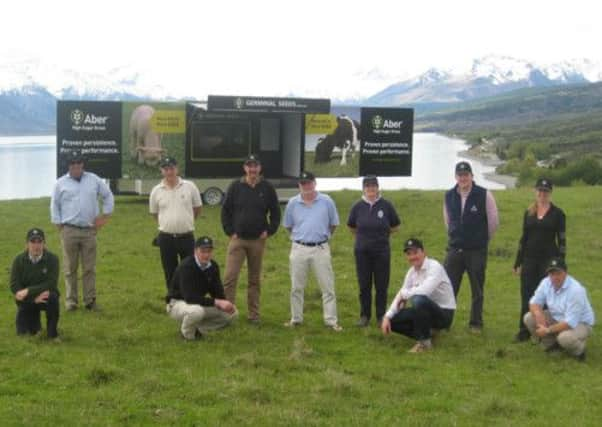New Zealand tips for local farmers


David Little, 29, travelled to New Zealand to learn from the seeding practices of southern hemisphere farmers and to bring that knowledge back to Northern Ireland to help farmers here reap the same benefits.
As a result of their reseeding practices farmers in New Zealand are seeing more milk produced, more meat produced, lambs are gaining more weight than before and there is less nitrogen waste to the environment. And not only that, but because farmers in New Zealand are using AberHSG ryegrass, they are getting the benefits of its strong persistency as it lasts longer.
Advertisement
Hide AdAdvertisement
Hide AdDavid, who has recently been employed by leading seed merchants, Samuel McCausland Ltd, as an Agricultural Technical Adviser, said the seeding practices in New Zealand can provide phenomenal results for farmers across Northern Ireland too.
He said: “The message to farmers is simple and that is the importance of reseeding cannot be emphasised enough. When I was out on the big farms there, the farmers spoke to me about top quality forage which is being produced. As a result, some farmers were able to speak about the milk yield increase of 7.5 per cent in their early lactation and by 21 per cent in late lactation. Big dairy farmers, who are milking over 1,000 cows per day, are delighted because they are getting so much more milk from their cows and that’s because of the grass they are feeding on.”
David continued: “Farmers don’t have to reseed, but, if they do, the benefits are huge. The reseeding rate in New Zealand is a lot higher compared to Northern Ireland. Farmers there are very keen on the AberDart HSG and AberMagic HSG. Aber works and everyone we spoke to, be that cattle, dairy, deer or sheep farmers, all prefer the Aber grasses because it outperforms anything they have ever tried.”
He said that farmers told him they simply can’t get enough of the AberDart HSG. “When farmers reseed with AberDart they get grass which has more sugar in it which makes it more palatable than any other type of ryegrass. Stock grazes vigorously on it which means there is an increase in meat and milk production. Animal performance greatly improves and the grass also means high quality silage,” he explained.
Advertisement
Hide AdAdvertisement
Hide AdDavid, who studied agriculture at Greenmount College, said dairy farmers in New Zealand are always striving for best performance. New Zealand accounts for over a third of the world’s international dairy trade so using the right seed, to produce the right grass, is paramount to all dairy farmers.
He added: “Farmers in Northern Ireland know that reseeding makes a huge improvement in grass quality and yield and it contributes to the overall farm efficiency. It’s key to introduce better quality grass in the Spring and Autumn so farmers can reap the benefits.
“In New Zealand none of the cows are housed. They are out grazing 365 days per year. That’s a lot of grazing but the yield copes with that high level because farmers keep reseeding and keep putting in the best seed varieties.
“Agriculture has entered a new era in which efficient, home grown forage production must go hand in hand with the environmental considerations. High Sugar Grass varieties, bred by IBERS, are a new generation of grasses designed to meet these needs in the 21st century.
Advertisement
Hide AdAdvertisement
Hide Ad“In three zero-grazing trials involving early, mid and late lactation animals, the amount of feed nitrogen lost in the urine was reduced by up to 24 per cent from animals fed the HSG.”
David, who has been working as a technical adviser since the start of January, said brochures are left across Northern Ireland with their wholesalers but his role involves offering technical advice to farmers on the different mixtures.
He explained: “There are a lot of mixtures and people are farming on different types of ground so I am here to help farmers chose the right mix for their land. We would love to see farmers in Northern Ireland reaping the same benefits as those in New Zealand.”